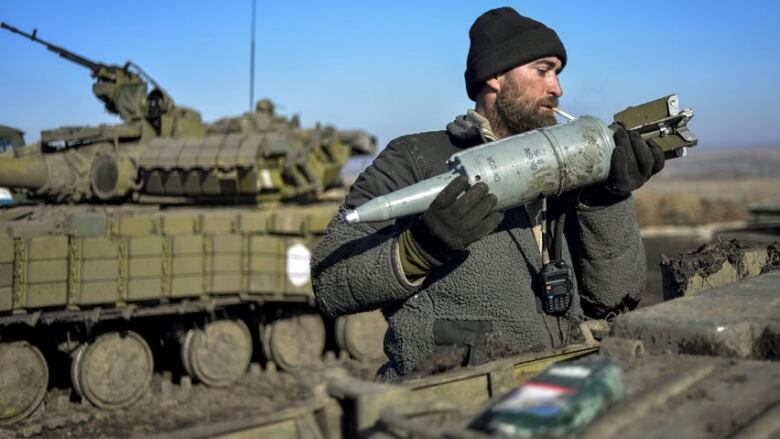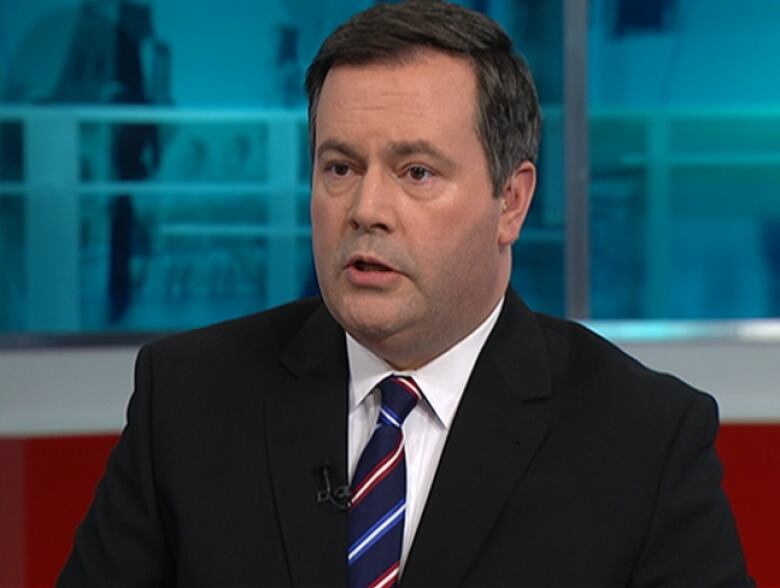Ukraine ceasefire: Poroshenko orders ceasefire, shelling stops in line with pact
Fighting had intensified before pact was to take effect at midnight
Shelling suddenlystopped at midnight local time in the eastern Ukrainian city of Donetskafter President Petro Poroshenko gave the order to governmentforces to halt firing in line with a ceasefire agreement reached
last Thursday.
Poroshenko, wearing the uniform of the armed forces supremecommander, said in a televised address in the capital Kiev thatthere was still "alarm" over the situation around Debaltseve, akey transport hub, where government forces are hard pressed byencircling Russian-backed separatists.
- Listen to The House on CBC Radio and online
- Ukraine fighting rages on in run-up to ceasefire
- Jason Kenney says Canada is open to training Ukrainian forces
He warned that Ukraine, if it wereslapped once, wouldnot offer the other cheek.
Butseated alongside armed forces Chief of Staff ViktorMuzhenko, he added: "I very much hope that the last chance tobegin the long and difficult peaceful process for a politicalsettlement will not be wasted.
said.
Military spokesmanVladyslavSelezynovsaid the Ukrainianarmed forces immediately fulfilled the order and the big gunsfell silent in Donetsk and some other parts of theseparatist-leaning east.

The ceasefire, negotiated in four-power talks in Belaruslast Thursday, forsees creation of a neutral "buffer zone" and
withdrawal of heavy weapons responsible for many of the 5,000deaths in a conflict that has caused the worst crisis in
Russia-West relations since the Cold War a generation ago.
The deal wassealed by the leaders of Germany and France after 16 hours of all-night talks in Minsk, the capital of Belarus, with the Russian and Ukrainian presidents.
Earlier in the run-up to midnight, heavy artillery androcket fire roughly every five seconds had reverberated across
Donetsk, the main regional city in the east which is under thecontrol of the pro-Russian secessionists.
InArtemivsk, a town in government-controlled territorynorth ofDebaltsevethathas been hit twice in two days by
rocket attacks, there was also silence at midnight.
Poroshenko, Obama, Merkel speak
A member of a Ukrainian pro-government unit near the easterntown ofHorlivkawho only gave his nickname ofTurnirsaid ontelevision Channel 112: "It's quiet. It's been quiet for half anhour. But we are waiting. We don't believe them. For the pastthree days they have been banging us hard."
Debaltseve, a strategic rail junction that lies in a pocketbetween the two main rebel-held regions, has been the focus ofsome of the fiercest recent fighting.

"The president spoke with Ukrainian PresidentPoroshenkotoday to express his sympathy for the mounting toll of the
conflict in Eastern Ukraine and his deep concern about the ongoing violence, particularly in and aroundDebaltseve," theWhite House said in a statement about the call with theUkrainian leader.
In his call with Merkel, who helped broker the latestceasefire pact, Obama thanked the German leader for her work.
"They also agreed on the pressing need for all signatoriesto implement the ceasefire and protocol agreements reached atMinsk last September and reaffirmed by the Minsk ImplementationPlan this week," the White House said.
The rebels have advanced far past the line of an earlier ceasefire deal, agreed in September, and the new accord appears to envisage them withdrawing their guns around 75 km, to take them back behind it, while Ukrainian guns would move 25 kilometresback.
Thursday's four-power accord also prescribed constitutional reform to give Eastern Ukraine, where many Russian speakers live, more autonomy. Kyiv has made clear it rejects independence for the "People's Republics" the rebels have declared.
Tatyana Demchenko, deputy commander of the rebel unit in the town of Horlivka, said she had little faith the ceasefire would hold. "They'll shoot at us and we have to remain silent? Militias may receive the order not to open fire, but what we sit and die in shelling? If they don't shoot, we won't," she said, holding two grenades in her hands.
The Group of Seven industrialized countries issued a statement late on Friday calling on all sides to refrain from actions that would hinder the start of the ceasefire. It said G7 countries were ready to take "appropriate measures" against those who violate the agreement, an apparent threat of more punitive economic sanctions against Russia shortly.
Financial aid package from Canada

"I can't give you a precise date but when Prime Minister Harper visited Ukraine (he) confirmed Canada would provide financial assistance," Kenney said in the interview. "We are hoping to continue to do so."
You can hear more of Kenney's interview on Ukraine, Iraq and the upcoming federal budget onThe House,
With files from CBC News













_(720p).jpg)


 OFFICIAL HD MUSIC VIDEO.jpg)
.jpg)



























































































